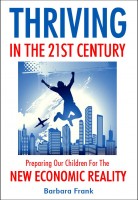The worse the economy gets, the more I’m seeing articles like this one asking whether today’s expensive college degrees are worth it. I suppose editors figure articles like this will grab the attention of those with degrees who can’t find work (misery loves company) and those without degrees who can’t find work (they’re thinking “See, a degree wouldn’t have helped!”)
The article is somewhat helpful in that the reporter tries to present both sides of the story. But there’s nothing there that you probably haven’t heard before, and some of the statistics used are a bit questionable. For example:
Studies indicate that college graduates are healthier, donate more blood, vote more often than other Americans and are more open-minded. They smoke less, exercise more and, a 2005 Pew study found, were 25 percent more likely than high school graduates to declare they were happy.
Note that it refers to college graduates. Last I heard, only half of college students actually graduate. So it makes sense that grads will be happier than non-grads, because many of the non-grads have the debt but not the sheepskin! Also, a healthy chunk of those who graduate come from families with above average income, which is where the likelihood of better health, less smoking and more exercise comes from, too. Other studies have shown that being happy is related to good health and having enough money. So duh.
Then there’s this factoid:
In 2007, Sandy Baum, a professor of economics at Skidmore College in Saratoga Springs, N.Y., studied the value of a degree for the College Board. ….Baum said that college was easily worth the cost. Plus the recession has laid bare another factor to consider:
“Even in this economy, the number of unemployed college graduates is half that of the unemployed who did not go to college,” she said.
That’s supposed to make college “easily worth the cost”? How so? As noted later in the article, less than 1/3 of American adults are college grads. That means more than 2/3 of American adults are not college grads. Since 1/3 is half of 2/3, it makes sense that the number of unemployed college grads would be half of the number of unemployed non-college grads. If college was “easily worth the cost,” a far smaller percentage of college grads would be unemployed. As it stands, the unemployment rate of the two groups is about the same. Hardly a point on the pro-college side.
OK, so I’m picking nits. I guess I’m just getting tired of the pro-college cheerleaders (note that Dr. Baum’s study was for the College Board) whistling in the dark. But bear with me while I share one more reason for going to college, from the article:
Another, even grimmer way to look at it: The poverty rate is 10.8 percent among high school grads. It is one-third less for those with bachelor’s degrees.
I got out my trusty calculator and learned that if this statement is true, then the poverty rate among college grads is 7.1%. I’m sorry, but 7.1% vs. 10.8% doesn’t seem like an earth-shattering difference to me.
Ultimately, it doesn’t matter. What does matter is that parents believed the hype about college being a necessity and sent their kids there in droves. Now we’ve got way more college grads than we need. The lousy economy makes the situation even worse.
What to do? I found some thought-provoking suggestions in the comments section of the article. Here are a few that made sense to me:
“I’m glad I never went to college until I was sure of what I wanted to do for a living instead of wasting my education by studying some major that was only somewhat interested in……I know so many who never liked the field they studied for.”
“Higher education in this country is a scam, it’s bloated, over-priced, and has sold us a bill of goods for the last 20 years. When a student pays $1,000 for a class at a state institution and has a grad student teach it (while the professor ‘conducts research’) that amounts to robbery. The entire system from 7th grade on up needs to be scrapped and re-designed.”
“There needs to be more emphasis on technical careers. Everyone is not college material and some people just don’t want to go to college. High school guidance counselors need to do a better job of telling kids about technical careers (cosmetology, mechanics, HVAC, etc.). A middle class society needs to have a balance of college educated as well as citizens who have skills in technical fields. I’m probably wishing for too much, though.”
“Simply having a degree doesn’t separate you from the pack anymore like it once did as more and more people are earning their BS. It’s simply supply and demand now. Get a degree in economics along with 200,000 other students, and what job exactly requires an economics degree? How many people with marketing or business degrees do we need?
Focus on a specific career like engineering, something in the medical field, accounting, etc. and you’ll be fine…….And if you want to be a teacher, don’t spend $200k getting the degree because it’ll never pay itself back… go to school somewhere more reasonable.”
What do you think?

